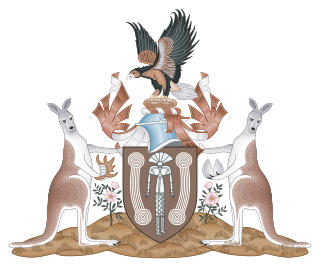Euthanasia is the practice of intentionally ending life to eliminate pain and suffering.

Assisted suicide – sometimes referred to as medical aid in dying – means a procedure in which people take medications to end their own lives with the help of others, usually medical professionals. The term usually refers to physician-assisted suicide (PAS), which is an end of life measure for a person suffering a painful, terminal illness. Once it is determined that the person's situation qualifies under the physician-assisted suicide laws for that location, the physician's assistance is usually limited to writing a prescription for a lethal dose of drugs.

The Rights of the Terminally Ill Act 1995 (NT) was a law legalising euthanasia in the Northern Territory of Australia, which was passed by the territory's Legislative Assembly on 1995. The Act was passed by the Northern Territory Legislative Assembly on 25 May 1995 by a vote of 15 to 10, received the Administrator's assent on 16 June 1995, and entered into force on 1 July 1996. A year later, a repeal bill was brought before the Northern Territory Parliament in August 1996, but was defeated by 14 votes to 11.
The right to die is a concept based on the opinion that human beings are entitled to end their life or undergo voluntary euthanasia. Possession of the right to die is often bestowed with the understanding that a person with a terminal illness, incurable pain, or without the will to continue living should be allowed to end their own life, use assisted suicide, or decline life-prolonging treatment. The question of who, if anyone, may be empowered to make this decision is often the subject of debate.
Voluntary euthanasia is the ending of a person's life at their request in order to relieve them of suffering. Voluntary euthanasia and physician-assisted suicide (PAS) have been the focus of intense debate in recent years. Some forms of voluntary euthanasia are legal in Australia, Belgium, Canada, Colombia, Luxembourg, the Netherlands, New Zealand, and Spain.

Suicide is a crime in some parts of the world. However, while suicide has been decriminalized in many countries, the act is almost universally stigmatized and discouraged. In some contexts, suicide could be utilized as an extreme expression of liberty, as is exemplified by its usage as an expression of devout dissent towards perceived tyranny or injustice which occurred occasionally in cultures such as ancient Rome, medieval Japan, or today's Tibet Autonomous Region.
Euthanasia in the Netherlands is regulated by the "Termination of Life on Request and Assisted Suicide Act" which was passed in 2001 and took effect in 2002. It states that euthanasia and physician-assisted suicide are not punishable if the attending physician acts in accordance with criteria of due care. These criteria concern the patient's request, the patient's suffering, the information provided to the patient, the absence of reasonable alternatives, consultation of another physician and the applied method of ending life. To demonstrate their compliance, the Act requires physicians to report euthanasia to a review committee.
Involuntary Euthanasia is currently illegal in all 50 states of the United States. Assisted suicide is legal in 10 jurisdictions in the US: Washington, D.C. and the states of California, Colorado, Oregon, Vermont, New Mexico, Maine, New Jersey, Hawaii, and Washington. The status of assisted suicide is disputed in Montana, though currently authorized per the Montana Supreme Court's ruling in Baxter v. Montana that "nothing in Montana Supreme Court precedent or Montana statutes [indicates] that physician aid in dying is against public policy."

Dignity in Dying is a United Kingdom nationwide campaigning organisation. It is funded by voluntary contributions from members of the public, and as of December 2010, it claimed to have 25,000 actively subscribing supporters. The organisation declares it is independent of any political, religious or other affiliations, and has the stated primary aim of campaigning for individuals to have greater choice and more control over end-of-life decisions, so as to alleviate any suffering they may be undergoing as they near the end of their life.

The legality of euthanasia varies between countries and territories. Efforts to change government policies on euthanasia of humans in the 20th and 21st centuries have met with limited success in Western countries. Human euthanasia policies have also been developed by a variety of NGOs, most advocacy organisations although medical associations express a range of perspectives, and supporters of palliative care broadly oppose euthanasia.
Euthanasia became legal in New Zealand when the End of Life Choice Act 2019 took full effect on 7 November 2021. It is illegal to "aid and abet suicide" under Section 179 of the New Zealand Crimes Act 1961. The clauses of this act make it an offence to "incite, procure or counsel" and "aid and abet" someone else to commit suicide, regardless of whether a suicide attempt is made or not. Section 179 covers both coercion to undertake assisted suicide and true suicide, such as that caused by bullying. This will not change under the End of Life Choices Act 2019, which has provisions on coercion of terminally ill people.

Laws regarding euthanasia or assisted suicide in Australia are matters for state and territory governments. As of November 2023 all states have implemented legislation creating an assisted suicide scheme for eligible individuals. These laws typically refer to assisted suicide as "voluntary assisted dying".

Assisted suicide is suicide with the aid of another person. In the United States, the term "assisted suicide" is typically used to describe what proponents refer to as medical aid in dying, in which terminally ill adults are prescribed and self-administer barbiturates if they feel that they are suffering significantly. The term is often used interchangeably with physician-assisted suicide (PAS), "physician-assisted dying", "physician-assisted death", "assisted death" and "medical aid in dying" (MAiD).
Both Euthanasia and Assisted Suicide are illegal in the United Kingdom and could be prosecuted as murder or manslaughter.
Terminal dehydration is dehydration to the point of death. Some scholars make a distinction between "terminal dehydration" and "termination by dehydration". Courts in the United States generally do not recognize prisoners as having a right to die by voluntary dehydration, since they view it as suicide.

Carter v Canada (AG), 2015 SCC 5 is a landmark Supreme Court of Canada decision where the prohibition of assisted suicide was challenged as contrary to the Canadian Charter of Rights and Freedoms ("Charter") by several parties, including the family of Kay Carter, a woman suffering from degenerative spinal stenosis, and Gloria Taylor, a woman suffering from amyotrophic lateral sclerosis ("ALS"). In a unanimous decision on February 6, 2015, the Court struck down the provision in the Criminal Code, thereby giving Canadian adults who are mentally competent and suffering intolerably and enduringly the right to a doctor's assistance in dying. This ruling overturned the Supreme Court's 1993 ruling in Rodriguez v British Columbia (AG), which had denied a right to assisted suicide.
Lecretia Anne Seales was a New Zealand lawyer who, upon suffering a brain tumour and enduring treatments for it, became an advocate of physician-assisted dying.

Seales v Attorney-General[2015] NZHC 1239 was a 2015 court case concerned with whether a doctor could assist a terminally ill patient in ending her own life. Wellington lawyer Lecretia Seales, terminally ill from a brain tumour, sought High Court declarations to the effect that her doctor would not be committing murder, manslaughter or assisting a suicide if he assisted in her euthanasia. Seales also sought, as an alternative, that the court make declarations that the Crimes Act was not consistent with the New Zealand Bill of Rights Act 1990. The Court declined to make any of the declarations sought by Seales. Seales died of her illness the day after the judgment was delivered.

The End of Life Choice Act 2019 is an Act of Parliament in New Zealand that gives people with a terminal illness the option of receiving assisted suicide or euthanasia. The act came into force on 7 November 2021, twelve months after the 2020 euthanasia referendum was declared in favour of the legislation.
Euthanasia for mental illness involves a physician intentionally ending the life of a patient who has requested euthanasia due to a psychiatric condition. The practice is legal in Belgium, the Netherlands, Luxembourg, Spain and Colombia. In Canada, legislation authorizing the procedure was passed, but has since been repeatedly postponed.










